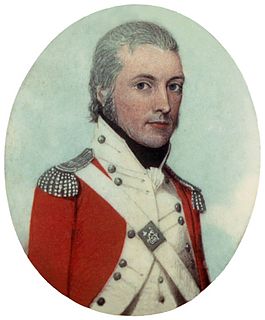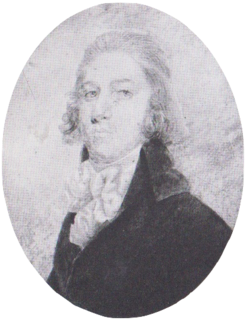Australian service

On 20 December 1786 Shairp volunteered for service in Australia with the Botany Bay Marine detachment. [2] [3] Three weeks later he embarked aboard the convict transport Alexander for the voyage to Australia, arriving as part of the First Fleet on 18 January 1788. [2] [5]
In November 1788 he was named second-in-command to Captain James Campbell for the expedition to found the colony's first inland settlement, at Rose Hill, leading a party of twenty-five marines and seventy convicts. [6] Campbell, Shairp and fellow Marine lieutenant John Johnson remained at Rose Hill for the following eighteen months, overseeing the garrison and ensuring construction of a redoubt with barracks for officers and a hundred soldiers. Barracks construction was completed in April 1790, several months ahead of similar works in Port Jackson. [6]
Criminal Court Affair
In addition to his duties as a Marine, Shairp and his fellow officers had been designated assistant judges for the colony's Criminal Court, acting in place of a jury. As a consequence of this service, Shairp became an unwilling participant in the "Criminal Court Affair" of April 1789, a constitutional dispute which placed him in direct conflict with his superior officer Captain Campbell, and with Marine commander Major Robert Ross. [7]
Since 1788 Major Ross had consistently objected to Marine officers serving on civilian courts, considering it an insult to their separate chain of command and an encroachment on their military role. [7] In April 1789 the colony's Judge Advocate David Collins ruled against prosecuting a convict charged with perjuring themselves in a case involving a Marine; in retaliation, Major Ross persuaded Captain Campbell to write to Collins refusing to serve on the civilian Court. [7] Ross then called a meeting with three junior officers: Shairp and Johnson from Rose Hill, and lieutenant John Poulden from Port Jackson, at which he urged them to join Campbell in refusing to serve on the Court. [8]
Shairp and his fellow junior officers refused. Instead they wrote to colonial Governor Arthur Phillip stating that the Collins-Campbell dispute was a "private disagreement" in which they had no part. [7] On the specific question of military officers sitting as members of a civilian court, Shairp advised Major Ross that he had seen the Act of Parliament establishing the colony of New South Wales, and, "always conceived it to be part of my duty to sit on criminal courts when ordered, during the time of my remaining in this country." [9]
Governor Phillip convened a Court of Enquiry to investigate the matter. Phillip also directed that Marine officers fill roles as assistant judges for the Enquiry itself, despite continued opposition from Major Ross. On consideration the Enquiry upheld Shairp's view that court service by the Marines was legitimate in imperial law.
Despite this open defiance from three officers in his command, Ross chose not to pursue the issue. Captain Campbell reluctantly resumed his court duties alongside Shairp, Johnson and Poulden, claiming he was acting solely as a "volunteer." [10] However, Ross' friends made their displeasure known at Shairp's defiance of his commander. Following resolution of the Affair, fellow Marine Lieutenant Ralph Clark, a Ross loyalist, wrote of Shairp that, "he is a man that I detest from the bottom of my soul." [11]
The Affair itself, and Ross' attempt to influence Shairp and others against playing a role in civilian law enforcement, was sufficiently disturbing to Governor Phillip that in 1790 he successfully petitioned the British Government to replace the colony's entire Marine detachment with a regular army unit. [12]










